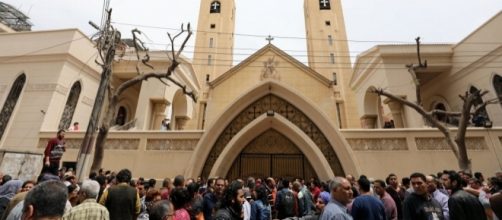The Islamic State carried out two suicide bombings in two Egyptian churches killing 44 and injuring more than 100 people while the worshipers were celebrating Palm Sunday, just a week before Easter. Not long ago, in December last year the Christian minority in Egypt was under attack killing dozens.
Details about the two bombings in Egypt
In the first attack, according to the officials, 27 were killed and 78 were injured in St. George's Church in the Nile Delta city of Tanta that is in the north of Cairo while the second explosion was carried out just a few hours later by an attacker in the St.
Mark's Cathedral, the historic seat of Christendom in Egypt, in the city of Alexandria killing 16 people and injuring 41 as confirmed by the Interior Ministry. The patriarch of the Egyptian Coptic Church, Pope Tawadros II was luckily unharmed in the attack.
According to the provincial governor Ahmad Deif, in the first explosion that took place inside the church in Tanta around 42 people were injured. “Either a bomb was planted or someone blew himself up,” the governor also said that the security personnel have investigated the inside and nearby areas of the church in order to look for any additional explosive materials.
The recent attacks are a proof that #Islamic State’s Egyptian faction is set to target the lives of Christian minority that make up around ten percent of around 92 million Egyptians in the otherwise Muslim majority country.
The radicals believe that the fifth president of Egypt Mohamed Morsi of the Freedom and Justice Party was ousted by the Egyptian Army with support from the Christian minority.
Christians under attack in Egypt
Egypt has seen a rise in Islamic militancy after the military took over the country in 2013 from under the rule of then Islamist President Morsi. In the year 2015, 21 Egyptian Christians workers who were employed in Libya were killed by IS. The ISIS affiliate based in the city of Sinai has been targeting mostly police personnel and soldiers. However, not only it claimed responsibility for the explosions that took the lives of civilians but also accepted that in 2015, they destroyed a Russian passenger plane over Sinai which resulted in the death of all 224 people who were on board.
Last year in early December, around 31 Christian worshipers were killed in attacks carried out by terrorists. After a video was released by ISIS in February early this year that called out for more attacks on the Christian minority of the society, 250 people from the Christian faith had to seek shelter in the city of Ismailiya. After the attacks, an address of the President of Egypt, Abdel Fattah al-Sisi, who is also the commander in chief of the Egyptian army, was broadcasted in which he declared three months long state of emergency and said: “(The attacks aim to) destabilize the fabric of Egypt... to give the impression that one group isn't protected as it should be,”. The current Pope of Roman Catholic Church Pope Francis is set to visit the Egyptian capital of Cairo on April 28-29 to show his support for the Christian minority of Egypt.
Reaction from US President Trump
After the bombings, US President #Donald Trump took to Twitter to express his views:
So sad to hear of the terrorist attack in Egypt. U.S. strongly condemns. I have great...
— Donald J. Trump (@realDonaldTrump) April 9, 2017
Just a week ago US President Trump and Egyptian President Abdel Fattah al Sisi met in Washington D.C where Mr Trump had said, "We are very much behind President al Sisi,” and that "He's done a fantastic job in a very difficult situation. We are very much behind Egypt and the people of Egypt."

